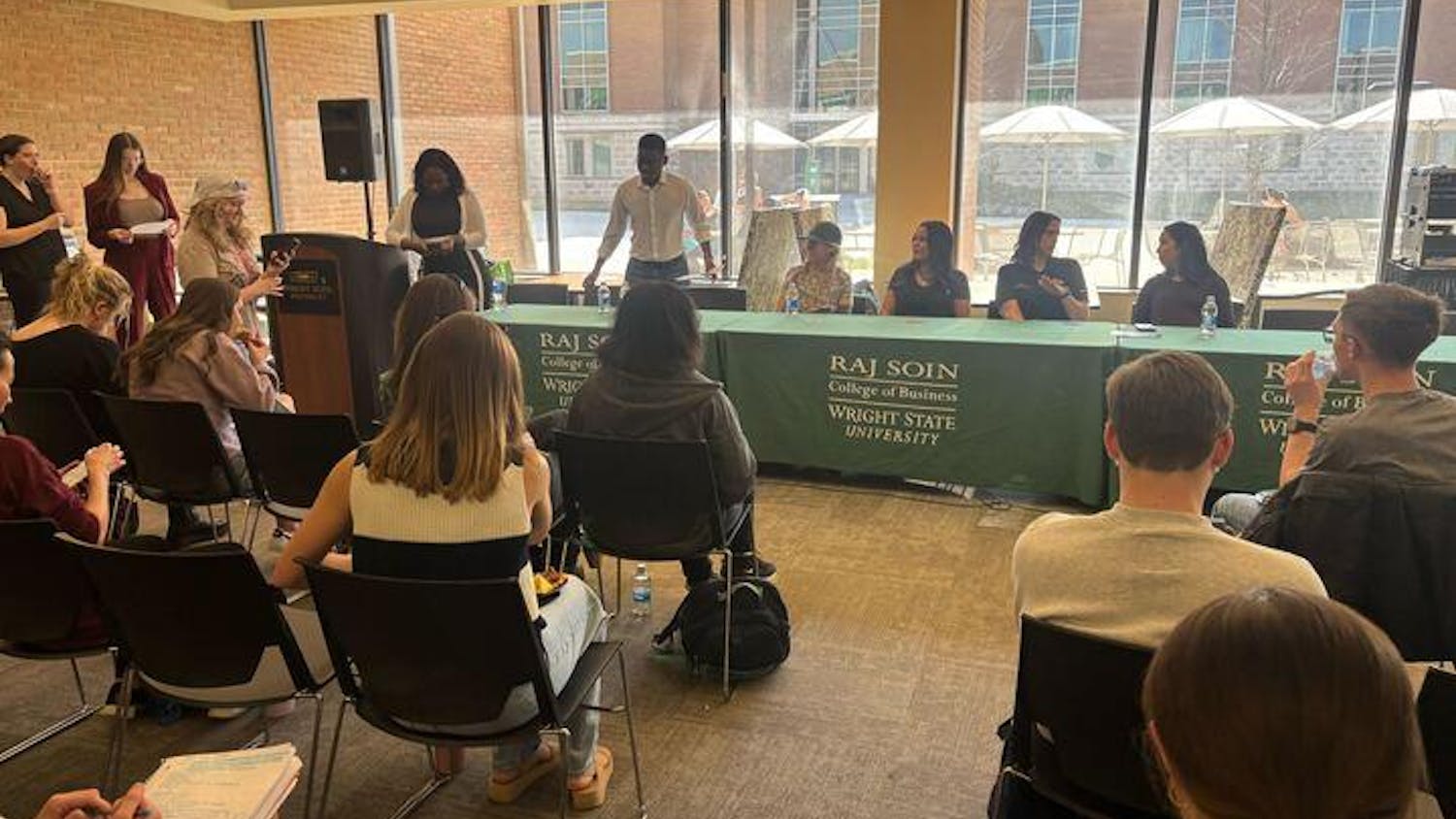Indigenous Peoples’ Day Read-a-thon | Graphic by Monica Brutto | The Wright State Guardian
On Monday, Oct. 14, Wright State University celebrated Indigenous People’s Day with its second annual Read-a-thon, where all participants took turns reading writings from Indigenous authors regarding their identities, cultures and experiences.
Event
When attendees entered the Cultural Identity Center, they were greeted by a snack table, and several other tables holding books and envelopes containing writing passages.
Nicolyn Woodcock, assistant director of the Asian and Native American Center, introduced herself and the event, explaining the etiquette and process of things. People would select envelopes or books and come up to the microphone to read a passage that stuck out to them.
Woodcock explained that the goal was for everyone to hear and feel these words, and the audience showed the utmost respect throughout the entire event.
After reading their passage, participants were given a raffle ticket to put their information on. Many prizes were available, including merchandise from the ANA Center and books “Calling for a Blanket Dance" by author Oscar Hokeah, who is Cherokee and Kiowan, and “Behind You is the Sea" by Susan Muaddi Darraj, a Palestinian American writer.
Purpose
“The idea of the read-a-thon is to amplify Indigenous voices,” Woodcock said.
Mateo Bush is the treasurer of the Indigenous American Culture Student Association at WSU and is a marketing major. He was one of the first to get up in front of the crowd and read a passage that spoke to him.
“When we have so many of those days ingrained into our society as American people, it's important that we really should look back and be like, hey, what we did and what we were trying to celebrate isn't how it should be celebrated properly, and especially when it comes to the displacement of so many native cultures,” said Bush.
He shared that through his involvement with IACSA, he has learned a lot about different cultures and social and ethnic backgrounds, which is something that he enjoys.
Asha Horton is a freshman with an undecided major, who recently started working as a student assistant at the ANA Center.
“Honestly, I don't know a lot about Native American culture. I'm gonna be so like, frank and honest about that, but I do love learning about other cultures because I'm kind of disconnected from my own culture because I'm half Filipino,” Horton explained.
Horton read several passages during the event, one of which was a passage from “Calling for a Blanket Dance,” one of the raffle prize books and a popular novel about Indigenous experiences and culture.
“The prose that I read,” Horton began, “they were talking about, like commodities, [and] like the tin, like salt cans or whatever, and how they made those into gourds and stuff, so they could secretly practice their culture. And I kind of drew parallelism down, like, yeah, there's a lot of like, shared experiences between [different] oppressed cultures.”
It was through passages such as these, as well as anecdotes that a few individuals shared, that people in attendance were able to hear directly about Indigenous cultures and experiences. By reading and hearing these stories, attendees were able to become more knowledgeable on these topics.
Indigenous People’s Day
“I've noticed since like 2020 especially, more and more cities, towns, businesses [and] organizations, are observing Indigenous People's Day in lieu of celebrating Columbus Day,” Woodcock explained. “Eventually, I think the direction we would love to go is to observe Indigenous People’s Day and kind of phase out the Columbus Day situation.”
The event, including some of the passages read aloud, stressed the importance of celebrating Indigenous lives instead of Columbus Day.
Woodcock kicked off the event by reading a passage about the land we are occupying here in Dayton and at WSU and acknowledging the tribes to which it once belonged. She read off of a slide titled “Land Acknowledgment.”
“Today we are occupying the homelands of the Shawnee, Lenni Lenape (Delaware), Ottawa, Myaamia (Miami), Wyandot and Seneca-Cayuga peoples,” Woodcock said, reading from this slide.
She explained that it is crucial to acknowledge where our land comes from and that it is essential to educate ourselves on the pain of this past. She stressed the importance of this for not only Indigenous People’s Day but every day and hopes that attendees will take away messages about this topic, as well as Indigenous authors that they can read to help with this.
“Indigenous People's Day is about global indigeneity. So of course, we want to uplift the voices of Native American folks, First Nation folks in North America, but we also want to think about that in a global context as well. So Pacific Islanders, Palestinians, all sorts of other people who are Indigenous to their lands and struggling against larger forces that are perhaps making life hard for them,” Woodcock said.
For those who missed the event, there are other ways to celebrate Indigenous heritage.
Friday, Nov. 15 through Sunday, Nov. 17, the annual Native American Heritage Festival will be on campus for all students to attend.









